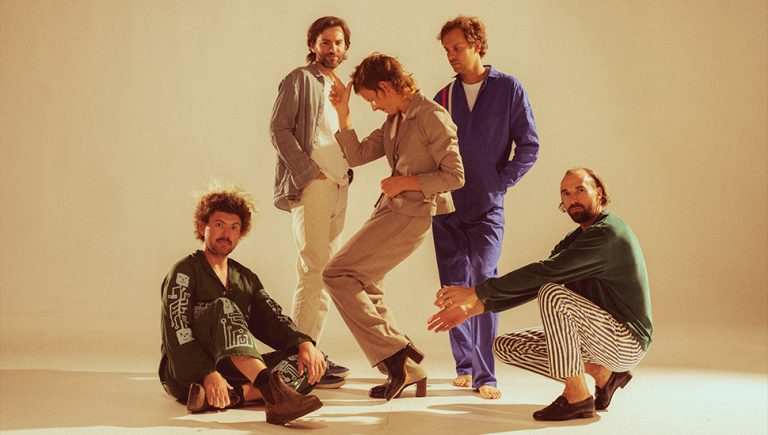What does the German visual artist Gerhard Richter have in common with anise-flavoured liqueur, Coney Island and Canadian newspaper, The Star? On paper, not a lot, but references to this assortment of phenomena were scrawled in the notebook of Pond frontperson, Nick Allbrook, as the band worked on their new album, 9.
In the lead up to the band’s ninth album, Allbrook had got in the habit of jotting down anything that caught his interest with the aim of using it as a lyrical building block. In the case of the aforementioned slew of signifiers, however, no such reorganising took place. All of these references—plus mentions of Manfred, magnetic tape and a “Chekhovian smile of last orchards”—show up in the record’s lead single, ‘Pink Lunettes’.
Pond’s two most recent LPs, 2019’s Tasmania and 2017’s The Weather, were widely recognised as the Fremantle psych band’s strongest studio output to date. But on album nine, Allbrook and his band mates—Jay Watson, Joe Ryan, Jamie Terry and James Ireland—were eager to expand their horizons.
“I think we were starting to repeat ourselves more and more and were probably in danger of getting really bad at it,” says Allbrook.
9 is Pond’s fleshiest, most blatantly dance-oriented record to date. The band’s penchant for apocalypse-signalling psychedelic pop is still in effect, but the hard slap and lyrical absurdity of ‘Pink Lunettes’ represents the sort of “abstract messiness” the band wanted to explore on 9.
Watch the official music video for ‘Human Touch’ by Pond

With the new album out now, Tone Deaf spoke to Allbrook about gentrification, 9’s stylistic orientation and what it feels like to be in Pond after more than a decade.
Love Music?
Get your daily dose of metal, rock, indie, pop, and everything else in between.
Tone Deaf: You wrote ‘America’s Cup’ about a pre-gentrified Fremantle. But it’s not a rant, even if does evoke a time of greater freedom and eccentricity and heroin use. Who is singing the song—not literally, but whose voice is it in?
Nick Allbrook: If you listen to the lyrics, I don’t think there’s any judgement being cast on any time before or after gentrification. It just sort of is. “Before the America’s Cup it was sailors and junkies, pescatores and bikies.” I guess it’s from my perspective.
I remember seeing a few things saying, like, “ ‘America’s Cup’ is an anti-gentrification banger,” or something like that. It’s like, not really.
TD: I think people are accustomed to hearing a negative judgement whenever gentrification is mentioned.
NA: You’re right. It’s a very thorny subject. But as a middle class white person, especially from Australia—a very upwardly mobile sort of place—it would probably be a bit on the nose to be vehemently anti-gentrification, wouldn’t it?
As a person who subsists on money made flogging off fucking vinyl to people, who would I be to write an anti-gentrification song? You know, the difference between a gentrified Williamsburg and an ungentrified Williamsburg is pretty much that Pond records get put in the places.
TD: ‘Pink Lunettes’ is one of the all-time great Pond singles. It has this high-energy looseness that I’ve experienced in your live shows, but rarely on record. Did that song provide a sort of blueprint for the spirit you wanted to conjure on 9?
NA: With every record, we have a sort of harebrained concept of what it’s going to be that’s really, really different from the last one. Like, “this one’s going to be full techno” or “this one’s going to be like J Dilla; we’re going to use samples and a ’90s drum machine.” And usually there’ll be one song that’s pretty on the money.
I think ‘Pink Lunettes’, it’s the more Suicide, Liquid Liquid type of tune on it, which was what we were thinking about at the beginning.
TD: Lyrically, ‘Pink Lunettes’ is basically one long stream of signifiers: chilled anisette, Richter’s Atlas, Coney Island, a Chekhovian smile, magnetic tape. It seems like you let the lyrics take shape without trying to force linear cohesion onto them.
NA: Yeah, no, they definitely just took shape. I had a little section of the notebook that’s a series of random things that I thought sounded nice or could be built on. But I didn’t build on them; they all just sort of coagulated in the song.
A lot of it’s just really nice phrases from Leonard Cohen’s book, The Favourite Game. Like, “a taste of chilled anisette,” “a Chekhovian smile softened mother’s face as she looked up from the Star.” I thought that was fucking great.
TD: For all the experimentation, the record still sounds very much like Pond. Your voice is a major factor in giving it that continuity, but experimentation is also part of the band’s DNA. Are you wary of repeating yourselves?
NA: Yeah, of course. Like, you know, writing a pseudo-whimsical, pseudo-psychedelic climate change-o ballad with some nicely arranged major seventh chords and some fat Juno-6 and a real gnarly riff at the end; produced by Kevin Parker, recorded in Fremantle, Western Australia; ten songs, bam, chuck it out: 7.2.
I think that’s why we were like, “We’ve got to at least try do something different.” And we tried to do something vastly different, which is a testament to how vastly the same we’re capable of staying, because it’s pretty on brand how it turned out in the end.
TD: What does Pond mean to you now, compared to ten, 11 years ago? It’s a fun band, clearly, but in terms of how much pride you take in your work, have your feelings changed much over nine albums?
NA: Yeah definitely. I think a lot of it for me I can trace pretty closely to an ego thing. Because it was so silly and so throwaway and so fun at the beginning, truly just not giving a fuck and committing the stupidest shit to record and releasing it around the world.
You know, the first two songs off Psychedelic Mango end with these fucked bongo and delay pedal jams and us moaning into a microphone. And sometimes I don’t know if that’s a lack of ego or this massive insecurity—the fear of being taken seriously, because then you can be taken down.
And then I think for a period we actually did take ourselves seriously, genuinely being fairly concerned with what people thought or what we were making or how we stood in the indie music world or whatever. I think we’re starting to give less of a fuck than our more optically punk youths [did].
TD: What about in terms of how much you care about the work you’re producing?
NA: I care so much. I love making good records. I actually imagined this album being like a double album, 35-song sort of Royal Trux/Ween, sweeping up every bit from the barber shop floor, making Tusk on meth. But then because we care about it, it gets polished up.
Purchase or listen to Pond’s latest album 9 here


































